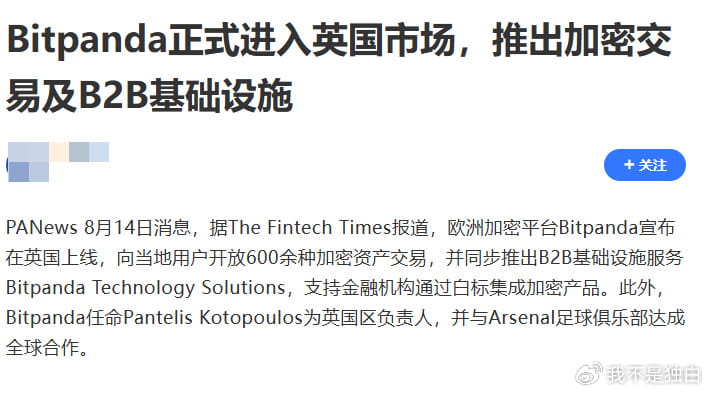European compliance giant Bitpanda enters the UK with FCA licensing, attracting 6 million users to trade over 500 cryptocurrencies! The white-label B2B solution transforms banks into exchanges instantly, and the ultimate gateway for traditional capital to enter has been sealed shut.

User options are increasing, and competition is becoming fiercer.
UK users can trade directly over 600 types of cryptocurrencies.
Increased options. Local platforms (like Revolut) need to quickly upgrade their services, or they risk losing users—this benefits ordinary investors and forces competitors to step up.
The key springboard for traditional institutions to enter with 'zero threshold'.
Bitpanda's B2B solution (Bitpanda Technology Solutions) allows banks and brokers to directly use its compliant trading system, effectively giving traditional finance a 'cryptocurrency fast lane ticket'.
In the future, we may see 'a major bank suddenly offering Bitcoin trading', which is actually powered by Bitpanda's technology—accelerating the flow of traditional capital into the crypto market.
Compliance barriers have been sealed shut, making it harder for small platforms to survive.
Secured licenses from the EU (MiCA), UK (FCA), and Dubai within six months.
Bitpanda has become the 'favored child of regulation'. Compliance has turned into a moat; small exchanges without licenses will either be acquired or exit the mainstream market.
The embryonic form of Europe's crypto ecosystem 'infrastructure'.
From custody and trading to institutional services (B2B), and then to Web3 wallets and Launchpads.
Bitpanda aims to be the European version of a Coinbase+Chainlink conglomerate. Once established, it could dominate the formulation of European crypto regulations.
Bitpanda has standardized the business of 'allowing traditional institutions to safely sell cryptocurrencies', marking the transition of the crypto market from its wild west phase to the stage where 'financial institutions enter the market in bulk'—long-term capital is now available, volatility may decrease, but the risk of monopoly by centralized giants is also here.
Working alone is never as comfortable as collaborating with a team; you want to make money, I want to prove myself, that's all.